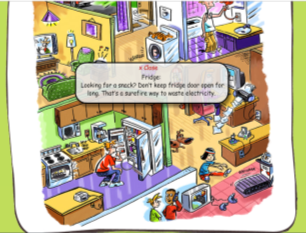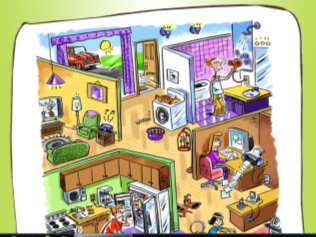Урок з англійської мови у 10 класі на тему "Energy saving.You can save!"
Topic : You can save!
Form : 10
Objectives:
- Students will be able to list and describe ways of saving energy .
- Students will be able to explain the importance of energy saving .
- Students will be able to practice key vocabulary on the topic.
- Students will be able to practice using active and passive voice.
Materials : the Internet, a laptop, a projector, mobile phones, worksheets, cards.
- Warm up
Game “Taboo words”
Choose a person to sit in front of the class, facing them in the “hot seat.” You will stand behind the students and hold up a piece of paper with a word on it. The students in the hot seats will not be able to see these papers. Students should get their hot seat member to say the word on the paper. The catch is they can’t say the word under any circumstances.
Word list:
- Fossil fuels
- Wind energy
- Hydropower energy
- Renewable energy
- Air conditioning
- Solar energy
- An electricity bill
- To plug in
- Petroleum
- Energy saving
- Light bulb
- To waste
- Greenhouse gases
- Global warming
II. Checking homework.
Students had to make notes about all possible ways to save energy while doing their everyday routine and try the ways practically.
Students read their ideas about saving energy in everyday life and comment on whether they find it difficult to stick to them.
III. Reading
Offer your students to read more information about saving.
Students read the text filling in the gaps.
While reading the text students should guess the meaning of the phrases and match them with their definitions.
- high and low
- a flip of a switch
- to bust a ghost
- to munch on
- to get something to eat.
- to finish a problem
- a short, quick motion to cause something to turn over quickly one or more times, or to cause something to move
- in many different places
Tips on saving energy
Whenever you leave a room, don’t forget to turn 1) ___ the light. And that goes for TVs and computer too! Here’s a bright idea. Have your parents replace incandescent (standard) light bulbs with compact fluorescent light bulbs (CFLs). They use up to 75% less electricity and last up to 10 times longer than standard bulbs.
Before you turn 2) ____ a light in a room, stop and think. Do you really need it? Or is there enough natural daylight already?
Give the dryer a break. Convince your parents to use a clothesline instead of a dryer. You’ll help cut 3) ____ on the amount of electricity they use.
Dirty dishes and laundry can wait. You should only run a dishwasher or dryer when it’s full. And it’s best to turn it on later in the evening. That way, it’s not being used during peak electricity periods.
On sunny summer days, close the drapes and blinds to keep the sun’s warm rays 4) ______. It’s a natural way of keeping the house cool. In the winter, open drapes and blinds to let the sun’s warming rays 5) _____.
At night, close them to keep the heat in. Instead of turning 6) ____ the air conditioning on a warm day, use a fan to cool things 7) _____. It requires a lot less electricity than an air conditioner. Now that’s cool!
Looking 8) ____ a snack? Don’t just leave the fridge door open while you search high and low for something to eat. That’s a surefire way to waste electricity. Decide what you want to munch 9) _____ before you even open that fridge door.
When it’s time to grab a bite to eat, have your folks reheat food in a toaster or microwave oven. It’ll save more electricity than if they used the oven.
Ghost bust those phantom loads! (Phantom load is electricity consumed
by electronic devices even when turned off.) Plug electronics like TVs, computers, game consoles, and chargers (MP3 players, cell phones, cameras etc.) into a power bar. With one easy flip of a switch you’ve got the power to bust those ghosts. Some even shut-off automatically.
Don’t get print-happy. To conserve electricity and paper, only print things when you really need to.
To save hot water, give 10) _____ on baths. (Don’t panic…we’re not saying to ditch cleanliness completely!) Take a quick shower instead. You’ll use about half as much hot water than if you took a bath.
Stop those drips! Have your parents fix any leaky faucets around the house. A constant drip can waste 182 litre-sized bottles of water a week!
- a) on b) off c) up
- a) in b) on c) down
- a) down b) of c) from
- a) out b) up c) apart
- a)away b) in c) for
- a) up b) back c) into
- a) around b) up c) in
- a) about b) for c) on
- a) over b) around c) on
- a) up b) out c) from
IV. Post-reading discussion.
Ask students what tips were not mentioned by them in their homework notes.
Discuss what points they are going to try to cut their water and electricity expenses.
V. Game “Spot the slip-ups”
As students have gained knowledge on saving offer them to check it in an entertaining way.
http://kids.saveonenergy.ca/en/games/spot_the_slipups.html

 Students take a look at the big scene and see if they can spot the ways they are wasting energy. To find the areas, they click the magnifying glass and drag it around the scene. To reveal the tip, they click the mouse button when an object is highlighted in red.
Students take a look at the big scene and see if they can spot the ways they are wasting energy. To find the areas, they click the magnifying glass and drag it around the scene. To reveal the tip, they click the mouse button when an object is highlighted in red.
VI. Grammar practice
Tell your students that our homes and lives have become so dependent on electricity that it is really hard to imagine everything that would change without it. But a hundred years ago life was quite different. Offer to compare some things then and now.
Instruct students to fill in the blanks with appropriate active or passive verb forms. Some of them can be used several times.
|
keep, use, do, wash, be, hang, can clean, turn |
|
Then |
Now |
|
Clothes __________ by hand with soap and water. |
Washing machines ________ clothes in less than an hour. |
|
Clothes __________ outside on clothesline to dry. |
Dryers _________ wet clothes to dry clothes quickly. |
|
Boxes with large blocks of ice ____________ to keep foods cold. |
Refrigerators ________ food cool or frozen. |
|
Charcoal and wood stoves ___________ for cooking and heating. |
Electric and gas oven ________ for cooking in most kitchens |
|
Candlelight, oil lamps and kerosene lamps _______ to light homes. |
Electric light bulbs, including energy-saving, ______ everywhere.
|
|
Household cleaning ____________ with a broom and dustpan. |
Some of today’s vacuum cleaners _________ strong enough to pick up a bowling ball. |
VII. Speaking
Discuss advantages and disadvantages of life without electricity.
Possible answers:
|
Advantages |
Disadvantages |
|
|
VIII. Hometask
Students write a short essay on the topic “Life With And Without Electricity”
Remind them to follow the structure:
Introduction: Address the question, show why it's interesting and how you will answer it.
Main body: Build your argument. Put your groups of ideas in a sequence to make a persuasive argument. One main point in each paragraph.
Conclusion: Summarize your arguments and evidence, and show how they answer the original question.
IX. Assessment
Worksheet 1
Reading
Read the information about saving and fill in the gaps.
While reading the text guess the meaning of the phrases and match them with their definitions.
- high and low
- a flip of a switch
- to bust a ghost
- to munch on
- to get something to eat.
- to finish a problem
- a short, quick motion to cause something to turn over quickly one or more times, or to cause something to move
- in many different places
Tips on saving energy
Whenever you leave a room, don’t forget to turn 1) ___ the light. And that goes for TVs and computer too! Here’s a bright idea. Have your parents replace incandescent (standard) light bulbs with compact fluorescent light bulbs (CFLs). They use up to 75% less electricity and last up to 10 times longer than standard bulbs.
Before you turn 2) ____ a light in a room, stop and think. Do you really need it? Or is there enough natural daylight already?
Give the dryer a break. Convince your parents to use a clothesline instead of a dryer. You’ll help cut 3) ____ on the amount of electricity they use.
Dirty dishes and laundry can wait. You should only run a dishwasher or dryer when it’s full. And it’s best to turn it on later in the evening. That way, it’s not being used during peak electricity periods.
On sunny summer days, close the drapes and blinds to keep the sun’s warm rays 4) ______. It’s a natural way of keeping the house cool. In the winter, open drapes and blinds to let the sun’s warming rays 5) _____.
At night, close them to keep the heat in. Instead of turning 6) ____ the air conditioning on a warm day, use a fan to cool things 7) _____. It requires a lot less electricity than an air conditioner. Now that’s cool!
Looking 8) ____ a snack? Don’t just leave the fridge door open while you search high and low for something to eat. That’s a surefire way to waste electricity. Decide what you want to munch 9) _____ before you even open that fridge door.
When it’s time to grab a bite to eat, have your folks reheat food in a toaster or microwave oven. It’ll save more electricity than if they used the oven.
Ghost bust those phantom loads! (Phantom load is electricity consumed
by electronic devices even when turned off.) Plug electronics like TVs, computers, game consoles, and chargers (MP3 players, cell phones, cameras etc.) into a power bar. With one easy flip of a switch you’ve got the power to bust those ghosts. Some even shut-off automatically.
Don’t get print-happy. To conserve electricity and paper, only print things when you really need to.
To save hot water, give 10) _____ on baths. (Don’t panic…we’re not saying to ditch cleanliness completely!) Take a quick shower instead. You’ll use about half as much hot water than if you took a bath.
Stop those drips! Have your parents fix any leaky faucets around the house. A constant drip can waste 182 litre-sized bottles of water a week!
- a) on b) off c) up
- a) in b) on c) down
- a) down b) of c) from
- a) out b) up c) apart
- a)away b) in c) for
- a) up b) back c) into
- a) around b) up c) in
- a) about b) for c) on
- a) over b) around c) on
- a) up b) out c) from
Worksheet 2
Fill in the blanks with appropriate active or passive verb forms. Some of them can be used several times.
|
keep, use, do, wash, be, hang, can clean, turn, can pick up |
|
Then |
Now |
|
Clothes __________ by hand with soap and water. |
Washing machines ________ clothes in less than an hour. |
|
Clothes __________ outside on clothesline to dry. |
Dryers _________ wet clothes to dry clothes quickly. |
|
Boxes with large blocks of ice ____________ to keep foods cold. |
Refrigerators ________ food cool or frozen. |
|
Charcoal and wood stoves ___________ for cooking and heating. |
Electric and gas oven ________ for cooking in most kitchens |
|
Candlelight, oil lamps and kerosene lamps _______ to light homes. |
Electric light bulbs, including energy-saving, ______ everywhere.
|
|
Household cleaning ____________ with a broom and dustpan. |
Some of today’s vacuum cleaners _________ strong enough to pick up a bowling ball. |
Answer keys
Tips on saving energy
Whenever you leave a room, don’t forget to turn 1) off the light. And that goes for TVs and computer too! Here’s a bright idea. Have your parents replace incandescent (standard) light bulbs with compact fluorescent light bulbs (CFLs). They use up to 75% less electricity and last up to 10 times longer than standard bulbs.
Before you turn 2) on a light in a room, stop and think. Do you really need it? Or is there enough natural daylight already?
Give the dryer a break. Convince your parents to use a clothesline instead of a dryer. You’ll help cut 3) down on the amount of electricity they use.
Dirty dishes and laundry can wait. You should only run a dishwasher,
washer or dryer when it’s full. And it’s best to turn it on later in the evening. That way, it’s not being used during peak electricity periods.
On sunny summer days, close the drapes and blinds to keep the sun’s warm rays 4) out. It’s a natural way of keeping the house cool. In the winter, open drapes and blinds to let the sun’s warming rays 5) in.
At night, close them to keep the heat in. Instead of turning 6) up the air conditioning on a warm day, use a fan to cool things 7) off. It requires a lot less electricity than an air conditioner. Now that’s cool!
Looking 8) for a snack? Don’t just leave the fridge door open while you search high and low for something to eat. That’s a surefire way to waste electricity. Decide what you want to munch 9) on before you even open that fridge door.
When it’s time to grab a bite to eat, have your folks reheat food in a toaster or microwave oven. It’ll save more electricity than if they used the oven.
3
Ghost bust those phantom loads. (Phantom load is electricity consumed
by electronic devices even when turned off.) Plug electronics like TVs, computers, game consoles, and chargers (MP3 players, cell phones, cameras etc.) into a power bar. With one easy flip10) of a switch you’ve got the power to bust those ghosts. Some even shut-off automatically.
Don’t get print-happy. To conserve electricity and paper, only print things when you really need to.
To save hot water, give 11) up on baths. (Don’t panic…we’re not saying to ditch cleanliness completely!) Take a quick shower instead. You’ll use about half as much hot water than if you took a bath.
Stop those drips! Have your parents fix any leaky faucets around the house. A constant drip can waste 182 litre-sized bottles of water a week!
- high and low - b
- a flip of a switch - d
- to bust a ghost - c
- to munch on - a
- to get something to eat
- in many different places
- to finish a problem
- a short, quick motion to cause something to turn over quickly one or more times, or to cause something to move
|
Then |
Now |
|
Clothes were washed by hand with soap and water. |
Washing machines can clean clothes in less than an hour. |
|
Clothes were hung outside on clothesline to dry. |
Dryers turn wet clothes to dry clothes quickly. |
|
Boxes with large blocks of ice were used to keep foods cold. |
Refrigerators keep food cool or frozen. |
|
Charcoal and wood stoves were used for cooking and heating. |
Electric and gas oven are used for cooking in most kitchens |
|
Candlelight, oil lamps and kerosene lamps were used to light homes. |
Electric light bulbs, including energy-saving, are used everywhere.
|
|
Household cleaning was done with a broom and dustpan. |
Some of today’s vacuum cleaners are strong enough to pick up a bowling ball. |


про публікацію авторської розробки
Додати розробку
